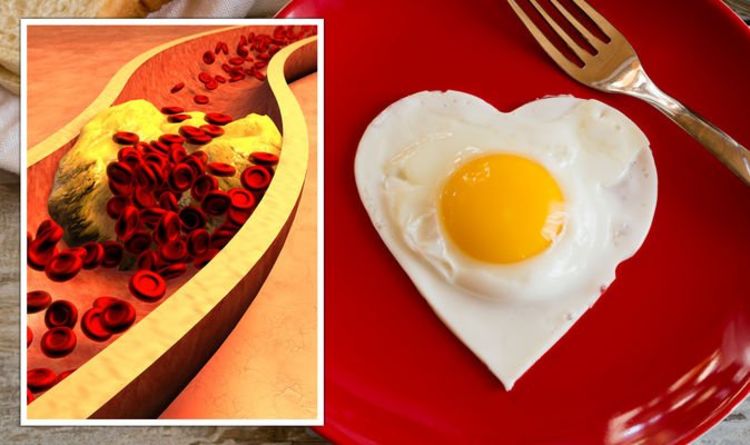High cholesterol: Nutritionist reveals top prevention tips
We use your sign-up to provide content in ways you’ve consented to and to improve our understanding of you. This may include adverts from us and 3rd parties based on our understanding. You can unsubscribe at any time. More info
Does eating high cholesterol foods cause high cholesterol? The answer is more complicated than you might think, as foods can contain cholesterol but not actually cause high cholesterol on the same scale as others. This is everything you need to know about a high cholesterol diet – including whether you can eat eggs.
According to the British Heart Foundation, high levels of cholesterol are associated with one in four deaths from heart and circulatory diseases in the UK.
If you’ve been diagnosed with high cholesterol, or you’re worried you could be at risk, the first place to look is your diet.
By eating healthier, you can improve the levels of bad cholesterol in your blood.
When it comes to cholesterol, there are important things to note about it.


First of all, there is good cholesterol and bad cholesterol.
When you get your cholesterol checked, the healthcare professional is looking at the levels of bad cholesterol in your bloodstream.
Your body naturally creates good cholesterol and it is used in every cell of the body. However, bad cholesterol can clog up your arteries, increasing the likelihood of developing health problems such as heart disease.
Bad cholesterol tends to come from diet but can also be caused by smoking and other factors.

For many Britons, high cholesterol comes from eating too much saturated fat.
Do eggs cause high cholesterol?
Eggs have often been associated with high cholesterol, because the egg yolk contains cholesterol.
However, eating cholesterol is not as damaging to your cholesterol levels as eating a high saturated fat diet.
According to Heart UK, the average Briton eats less than 300mg, or 0.3g, of cholesterol each day, which is a lot lower than how much saturated fat they eat.
DON’T MISS:
High cholesterol: Three signs on your toes [UPDATE]
High blood pressure: One vegetable that could lower your reading [INSIGHT]
How to live longer: Four immunity-boosting foods you should eat [ANALYSIS]

The NHS’s guide to saturated fats said men should eat no more than 30g of saturated fat per day, and women no more than 20g. However, many Britons will be consuming more than the NHS’s limit.
For most people, it’s saturated fat they need to cut down on rather than dietary cholesterol.
Food items including eggs, prawns, crab, squid and offal are high in dietary cholesterol, but low in saturated fat.
So, you can eat these foods in moderation without worrying about the effect they will have on your cholesterol.
Which foods cause high cholesterol?
Dangerous foods for people with high cholesterol are those which are high in saturated fat.
All animal products contain some cholesterol, so these foods may contain cholesterol too – but the saturated fat content is the more worrying aspect.
Foods including deep-fried foods, processed meats, full-fat dairy products and pastries are common culprits for causing high cholesterol.
You should avoid foods with high levels of saturated fat, and aim to eat more unsaturated, monosaturated or polysaturated “healthy” fats.
Sources of healthy fats include avocados, olive oil and oily fish.
Source: Read Full Article
